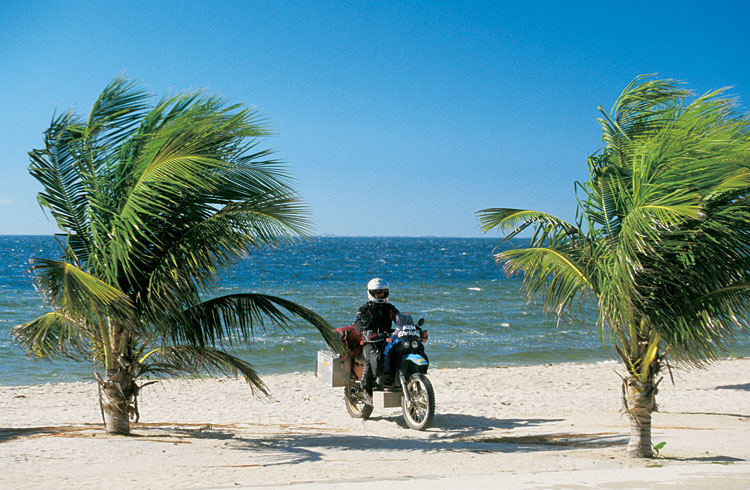Brazil: From the Amazon Basin to Rio

With the crossing by canoe of the rocky waters of the Mamoré River, we leave the tropical north of Bolivia and resume our two-wheel journey, heading north into a new and fascinating world called Brazil. A five-hour ride on intensely hot pavement takes us through lush fields to the town of Porto Velho in the Amazon Basin, but we are still a long way from seeing the real Amazon River.
At this point, after riding on jarring, washboard roads parallel to one of the Amazon's tributaries, from its spring at 16,500 feet in the Bolivian Andes, we've just reached the banks of Rio Madeira. From here, it's another 500 miles downstream before the Madeira joins the Amazon, which empties out into the Atlantic some 1,250 miles beyond that.
Reaching the Amazon by sailing down the Madeira seems like a good idea now, especially when considering the alternative - riding on over the Transamazonica, a dirt road serving as the only land connection, and extremely difficult to navigate if not impassable, depending on rainfall and the season. We find a transport, the Moreira IV, and negotiate with the captain. His card reads "Paulinho." Like the Brazilian soccer player Pelé, his full name has been replaced by a simple nickname, and after haggling with him over the price of our passage, we agree on 300 reals (about $ 120) per person and bike for a four-day journey from Porto Velho to Manaus. Then we carry all our belongings on board, tying our bikes to the railings.
We don't leave Porto Velho for another two days, the time it takes to load the boat. Much to our surprise, in this age of forklifts and containers, this is all done manually. Truckloads of potatoes, hundreds of crates of onions and garlic, and giant bunches of green bananas disappear into the hold of the 80-foot boat. The men at work, their bodies made muscular by years of hard labor, carry enormous loads down 42 steps hand-cut into the embankment. The heat and humidity are incredible, and we're sweating buckets just sitting in the shade watching. The only respite these Brazilians allow themselves is a glass of water from a jug before running up the hill again. By sunset, their steps get slower, but drenched in sweat they push on for another hour. A question of professional honor, and their pay for ten hours of slaving away is less than $ 4.

On board, the entire deck is covered with hammocks, typical "accommodations" for Brazilian river travel. Here, one measures personal space in inches. One hundred and fifty-two of us are packed into 150 square yards, making the utmost of the available space. Colored hammocks hang everywhere, above and below. At night, only the thin material prevents direct body contact with our neighbors. The boat community resembles an extended family, with all age groups represented - from the three-year-old kid to the 80-year-old grandmother. Amazingly, not one single fight breaks out in almost a week together, which seems like a miracle to us Europeans, who keenly value our personal space.
The boat's engine drones on monotonously as the days pass, unnoticed after a while as white background noise. The ride down river gives us a private view of life on these shores. Low wooden huts on stilts line the river bank against the immense backdrop of overgrown jungle. Their residents live simple lives, depending entirely on the bounty of the river. Fish makes up their livelihood, for food and for selling or trading for other goods, and as the river provides, so do they survive. Sadly, most of the little villages seem to have surrendered to the speedy cycle of decline a tropical environment causes.
One night while eating a fish dinner below deck, we feel and hear a heavy shaking and creaking of planks as the over-laden boat grinds to a standstill. In the sudden quiet that follows, the lights go out. Most of the passengers begin to panic and dive for the few life jackets not hidden behind the cargo. Of course, there aren't enough for all of us. And the four lifeboats, not much bigger than bathtubs, are completely inadequate for saving 160 people. But even with enough life jackets to go around, it was going to take a complete, unmitigated disaster to make us jump overboard into the murky depths and swim through the realm of piranhas and crocodiles in the middle of the night.